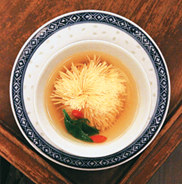 |
|
Double boiled chicken broth with tofu and matsutake at Yong Yi Ting at Mandarin Oriental Pudong, Shanghai. [Photo provided to China Daily] |
Mushroom tourism
Matsutake, which can be distinguished by its brownish cap and a plump white stem, grows at the roots of red pine trees. The best time to consume the mushroom is within three days of its harvest.
One of the notable matsutake harvest zones in Yunnan is in Shangri-La, Diqing Tibetan autonomous prefecture, where SF Express has established a logistics hub to deliver the mushrooms across the country. Gourmands have been known to travel all the way to this remote region to savor the matsutake.
"Mushroom tourism is still at its infancy but there is keen interest," said Eddie Zhu, general manager of Hylandia, a luxury hotel by hospitality group Shangri-La.
"It's just like a wine tour. Coming here to eat the mushroom doesn't necessarily make it taste better, but people just like to see where they grow and how they are harvested," said Zhu.
While there is no record of the number of guests who traveled to the region specifically to savor the matsutake, Zhu said that the hotel managed to sell 270 kg of the mushroom to their customers last year.
He expects mushroom tourism to extend the peak tourism season in the area by up to two months till mid-autumn. Tourist numbers are typically the highest from July to August and the lowest from December to April.
"The best matsutake mushrooms are not the longest ones but those that measure about 6 inches and have caps yet to open up like umbrellas - people believe these have the most intense aroma. I think Shangri-La tourism or mushroom tourism is also at a similar stage of opening-up now," said Zhu.